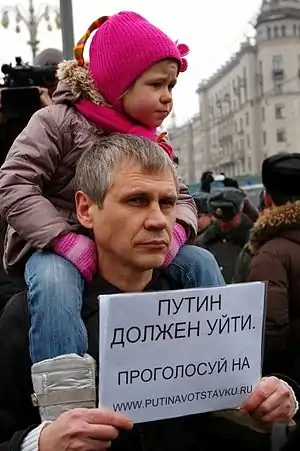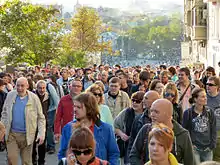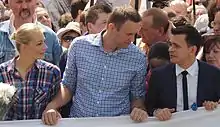Opposition to Vladimir Putin in Russia
 |
|---|
| This article is part of a series on the politics and government of the Russian Federation |
|
|

Opposition to the government of President Vladimir Putin in Russia can be divided between the parliamentary opposition parties in the State Duma and the various non-systemic opposition organizations. While the former are largely viewed as being more or less loyal to the government and Putin,[1][2] the latter oppose the government and are mostly unrepresented in government bodies. Major political parties considered to be part of the non-systemic opposition include Yabloko and the People's Freedom Party (also referred to as PARNAS), along with the unregistered party Russia of the Future. Other notable opposition groups included the Russian Opposition Coordination Council (2012–13) and The Other Russia (2006–11), as well as various non-governmental organizations (NGOs).
Their supporters vary in political ideology, ranging from liberals and socialists to nationalists and monarchists as well as apolitical individuals. They are mainly unified by their opposition to President Putin and corruption in the government.[3] However, a lack of unity within the opposition has also hindered its standing.[4][5] Furthermore, leading members of the opposition have become targets of violence, including assassinations and harassment, which they allege can be attributed to the government of Vladimir Putin. Opposition figures also claim that a number of laws have been passed and other measures taken by President Putin's government to prevent them from having any electoral success.
Background and white-ribbon opposition

Most opposition organizations independent from the Kremlin encounter a restrictive law on political parties, refusals of registration by the Justice Ministry, censorship in major mass media, primarily federal TV channels. According to Vladimir Ryzhkov, "over the last 4 years (i.e. from 2007 - Ed.) for identical "formal reason" nine political parties were denied registration - from left to right. And not any new party was registered. In modern Russia, this is not possible".[3]
The Guardian reporter Luke Harding noted that during the 2000s Russian nationalists and ultranationalist groups may have been the most significant right-wing opposition to Putin's government.[6]
Since 2012 for the protesters for fair elections the term white ribbon opposition has been applied, as they wore white ribbons as their symbol.[7]
Actions and campaigns of the opposition
Current campaigns of the opposition:
- Dissemination of anti-Putin reports: Putin. Results. 10 years (2010), Putin. Corruption (2011), Life of a Slave on Galleys (2012). Video versions of these reports, entitled Lies of Putin’s regime,[8] have been viewed by about 10 million times on the Internet.[9]
In addition, smaller-scale series of actions are conducted. For example, in Moscow in the spring of 2012 saw a series of flash mobs "White Square", when protesters walked through the Red Square with white ribbons,[7] in the late spring and summer, they organized the protest camp "Occupy Abay" and autumn they held weekly "Liberty walks" with the chains symbolizing solidarity with political prisoners.[10]
A Monstration is a parody demonstration where participants gently poke fun at Kremlin policies.[11]
Participation in elections
Some opposition figures, for example, chess grandmaster Garry Kasparov, said there are no elections in Putin's Russia,[12][13] and that participation in a procedure called elections only legitimizes the regime.
On the other hand, a small part of liberals (the party of "Democratic Choice") consider elections as the main tool to achieve their political goals.[14] The system opposition also supports participation in elections.
2009–2011 Strategy-31
Strategy-31 was a series of civic protests in support of the right to peaceful assembly in Russia guaranteed by Article 31 of the Russian Constitution. Since July 31, 2009, the protests were held in Moscow on Triumfalnaya Square on the 31st of every month with 31 days.[15] Strategy-31 was led by writer Eduard Limonov and human rights activist Lyudmila Alexeyeva.
2011–2013 Russian protests

Starting from 5 December 2011, the day after the elections to the State Duma, there have been repeated massive political actions of Russian citizens who disagree with the outcome of these "elections". The current surge of mass opposition rallies has been called in some publications "a snow revolution".[16][17][18][19] These rallies continued during the campaign for the election of the President of Russia and after March 4, 2012 presidential election, in which Putin officially won the first round. The protesters claimed that the elections were accompanied by violations of the election legislation and widespread fraud. One of the main slogans of the majority of actions was "For Fair Elections!" and a white ribbon has been chosen as symbol of protests. Beginning from spring 2012 the actions were called marches of millions and took the form of a march followed by a rally. The speeches of participants were anti-Putin and anti-government.
The "March of Millions" on 6 May 2012 at the approach to Bolotnaya Square was dispersed by the police. In the Bolotnaya Square case 17 people are accused of committing violence against police (12 of them are in jail). A large number of human rights defenders and community leaders have declared the detainees innocent and the police responsible for the clashes.[20][21]
For the rally on December 15, 2012, the anniversary of the mass protests against rigged elections, the organizers failed to agree with the authorities, and participation was low. Several thousand people gathered without placards on Lubyanka Square and laid flowers at the Solovetsky Stone.[22]
2014 anti-war protests

In 2014, members of the Russian opposition have held anti-war protests in opposition to Russian military intervention in Ukraine in the aftermath of the 2014 Ukrainian revolution and Crimean crisis. The March of Peace protests took place in Moscow on March 15, a day before the Crimean referendum. The protests have been the largest in Russia since the 2011 protests. Reuters reported that 30,000 people participated in the 15 March anti-war rally.[23]
2017–2018 Russian protests
.jpg.webp)
On 26 March 2017, protests against alleged corruption in the Russian government took place simultaneously in many cities across the country. The protests began after the release of the film He Is Not Dimon to You by Alexey Navalny's Anti-Corruption Foundation. An April 2017 Levada poll found that 45% of surveyed Russians supported the resignation of Russian Prime Minister Dmitry Medvedev,[24] against it 33% of respondents. Newsweek reported that "An opinion poll by the Moscow-based Levada Center indicated that 38 percent of Russians supported the rallies and that 67 percent held Putin personally responsible for high-level corruption."[25]
A May 2017 Levada poll found that 58% of surveyed Russians supported the protests, while 23% said they disapprove.[26]
2018 Russian pension protests
From July 2018, almost every weekend, protest rallies and demonstrations were organized against the planned retirement age hike. Such events occurred in nearly all major cities countrywide including Novosibirsk, St.-Petersburg and Moscow. These events were coordinated by all opposition parties with the leading role of the communists. Also trade unions and some individual politicians (among whom Navalny) functioned as organizers of the public actions.[27]
An intention to hike the retirement age has drastically downed the rating of the President Vladimir Putin and Prime Minister Dmitry Medvedev in Russia. So in July 2018, just 49% would vote for Putin if the presidential elections were held in that moment (while during the elections in March 2018, he got 76,7%).[28][29]
2019 Russian protests
_144614.jpg.webp)
In the first half of 2019 there were approximately 863 protests across the country.[30]
From July 2019, protest rallies for an access to 2019 Moscow City Duma election of independent candidates started in Moscow. The July 20 rally was the largest since 2012. The July 27 rally set a record in number of detainees and police violence.[31][32] The August 10 rally outnumbered the July 27 rally, oppositional sources report 50-60 thousand participants.[33]
2020–21 Khabarovsk Krai protests
On 9 July 2020, the popular governor of the Khabarovsk Krai, Sergei Furgal, who defeated the candidate of Putin's United Russia party in elections two years ago, was arrested and flown to Moscow. Furgal was arrested 15 years after the alleged crimes he is accused of. Every day since June 11, mass protests have been held in the Khabarovsk Krai in support of Furgal.[34] On 25 July, tens of thousands of people were estimated to have taken part in the third major rally in Khabarovsk.[35] The protests included chants of "Away with Putin!", "This is our region", "Furgal was our choice" or "shame on LDPR" and "Shame on the Kremlin!"[36][37][35]
In a Levada Center poll carried out from 24 to 25 July 2020, 45% of surveyed Russians viewed the protests positively, 26% neutrally and 17% negatively.[38]
2021 Russian protests

On 23 January 2021, protests across Russia were held in support of the Russian opposition leader Alexei Navalny, who was detained and then jailed after returning to Russia on 17 January following his poisoning. A few days before the protests, an investigation by Navalny and his Anti-Corruption Foundation was published, accusing Putin of corruption. The video garnered 70 million views in a few days.[39]
Opposition figures

_78.jpg.webp)
- Lyudmila Alexeyeva ☦
- Maria Alyokhina
- Vladimir Ashurkov
- Maria Baronova
- Anastasia Bryukhanova
- Dmitry Bykov
- Yevgeniya Chirikova
- Yuri Dud
- Yulia Galyamina
- Gennady Gudkov
- Dmitry Gudkov
- Lyubov Sobol
- Vladimir Kara-Murza
- Oleg Kashin
- Garry Kasparov
- Mikhail Kasyanov
- Maxim Katz
- Mikhail Khodorkovsky
- Eduard Limonov ☦
- Vyacheslav Maltsev
- Vladimir Milov
- Alexei Navalny
- Andrey Nechaev
- Boris Nemtsov ☦
- Valeriya Novodvorskaya ☦
- Leonid Parfenov
- Sergey Parkhomenko
- Andrey Piontkovsky
- Ilya Ponomarev
- Leonid Razvozzhayev
- Yevgeny Roizman
- Elena Rusakova
- Vladislav Ryazantsev
- Vladimir Ryzhkov
- Yekaterina Samutsevich
- Lev Schlosberg
- Yuri Shevchuk
- Ksenia Sobchak
- Nadezhda Tolokonnikova
- Sergei Udaltsov
- Pyotr Verzilov
- Leonid Volkov
- Konstantin Yankauskas
- Ilya Yashin
- Grigory Yavlinsky
- Gennady Zyuganov
- Maksim Shevchenko
- Ivan Zhdanov
- Yegor Prosvirnin
- Vasily Topolev
- Sergey Boiko
Opposition groups
Media depictions
Books
- 12 Who Don't Agree (2009), non-fiction book by Valery Panyushkin
Films
- Les Enfants terribles de Vladimir Vladimirovitch Poutine (2006)
- This is Our City (2007), by Alexander Shcherbanosov
- The Revolution That Wasn't (2008), by Alyona Polunina
- Term (2018), by Alexander Rastorguyev
See also
References
- Ben Noble, Putin just won a supermajority in the Duma. That matters., Washington Post (October 1, 2016): "During the 2011-2016 parliamentary session, the Kremlin often engineered supermajorities with votes from loyal opposition Duma deputies."
- Thomas F Remington, Presidential Decrees in Russia: A Comparative Perspective (Cambridge University Press, 2014), p. 44: "The 'within-system' opposition parties, such as the communists and A Just Russia, must be willing to play their prescribed role as tame, domesticated versions of a real opposition."
- Citation needed.
- Peter Finn, Infighting Fractures Russian Opposition: Kremlin's Democratic Foes Help Marginalize Themselves With Suspicions, Old Feuds, Washington Post (March 28, 2007).
- A fourth term for Russia's perpetual president, The Economist (March 19, 2018): "a fractured opposition."
- Luke Harding (7 February 2009). "Putin's Worst Nightmare". The Guardian.
- "Стой! Кто идет?". www.kasparov.ru.
- "Archived copy". Archived from the original on 23 July 2016. Retrieved 26 November 2016.CS1 maint: archived copy as title (link)
- b_nemtsov (10 November 2012). "Ролики "Ложь путинского режима"".
- "Грани.Ру: В Москве задержаны участники "Прогулки свободы"". graniru.org.
- "Moscow threatens to block BBC Russian service Service". Z News. 5 August 2014. Retrieved 5 August 2014.
- ""Выборов, которые приведут к отстранению Путина от власти, в России быть не может. Надо четко зафиксировать наш призыв к демонтажу существующей системы. Она убивает будущее России. Выживание путинского режима – это гибель страны. Вот об этом надо говорить, а не соблазнять людей предвыборными пустышками"". Радио Свобода.
- "Грани.Ру | Юрий Староверов: Марш регионов вместо иллюзий". graniru.org.
- "О нас. Что такое "Демократический выбор"?". Демократический выбор. Archived from the original on 29 April 2012. Retrieved 21 June 2010.
- Toepfl, Florian (April 2013). "Making sense of the news in a hybrid regime: how young Russians decode state TV and an oppositional blog" (PDF). Journal of Communication. 63 (4): 244–265. doi:10.1111/jcom.12018.
- "Ежедневный Журнал: Координационный совет накануне выборов". ej.ru.
- "Высокий градус русской зимы". Газета.Ru.
- Андерс Аслунд. Урок для России. Снежная революция не должна повторить ошибки Оранжевой. — KyivPost, 22.02.2012 Archived 13 September 2013 at the Wayback Machine
- "Протест против Путина: "снежная революция" в России тает". www.inopressa.ru.
- "За права человека". За права человека.
- "Грани.Ру: В Москве прошел митинг в поддержку "узников Болотной"". graniru.org.
- "Стояние у Соловецкого камня: Итоги запрещенной оппозиционной акции". Archived from the original on 17 December 2012. Retrieved 13 January 2013.
- "Ukraine crisis triggers Russia's biggest anti-Putin protest in two years". Reuters. 15 March 2014. Retrieved 16 March 2014.
- "Russian Polls Do Mean Something After All". Bloomberg. April 26, 2017.
- "Alexei Navalny: Is Russia's Anti-Corruption Crusader Vladimir Putin's Kryptonite?". Newsweek. April 17, 2017.
- "Акции протеста 12 июня". Levada Centre. 13 June 2017
- J. Heintz (28 July 2018). "Tens of thousands of Russians protest retirement age hikes". The Washington Times.
- S. Walker (16 July 2018). "Successful World Cup fails to halt slide in Vladimir Putin's popularity". The Guardian.
- R. Dobrokhotov (13 July 2018). "Why Putin's approval rating is falling". Al Jazeera.
- "Russian Officials Appear Unable to Suppress Protests". VOA News. 7 October 2019.
- Nechepurenko, Ivan (27 July 2019). "Moscow Police Arrest More Than 1,300 at Election Protest". The New York Times. ISSN 0362-4331. Retrieved 2 August 2019.
- "Thousand arrests at Moscow election protest". 27 July 2019. Retrieved 2 August 2019.
- "Митинг на проспекте Сахарова собрал, по данным источников "Эха Москвы", от 50 до 60 тысяч человек". Эхо Москвы (in Russian). Retrieved 12 August 2019.
- "Anti-Putin Protests in Russia's Far East Gather Steam". VOA News. 25 July 2020.
- "Protests Swell in Russia's Far East in a Stark New Challenge to Putin". The New York Times. 25 July 2020.
- "Anger at Kremlin Grows in Latest Massive Russian Far East Protest". The Moscow Times. 25 July 2020.
- "Anti-Kremlin protests in Khabarovsk: 'We hate Moscow!'". Deutsche Welle. 26 July 2020.
- "45 Percent of Russians Support Anti-Putin Protests While Just 17 Percent Oppose Demonstrations: Poll". Newsweek. 28 July 2020.
- "Protests for Jailed Kremlin Critic Navalny Sweep Russia". The Moscow Times. 23 January 2021.
External links
- List of political prisoners in Russia (Russian) in 2015, compiled by "New Chronicle of Current Events".